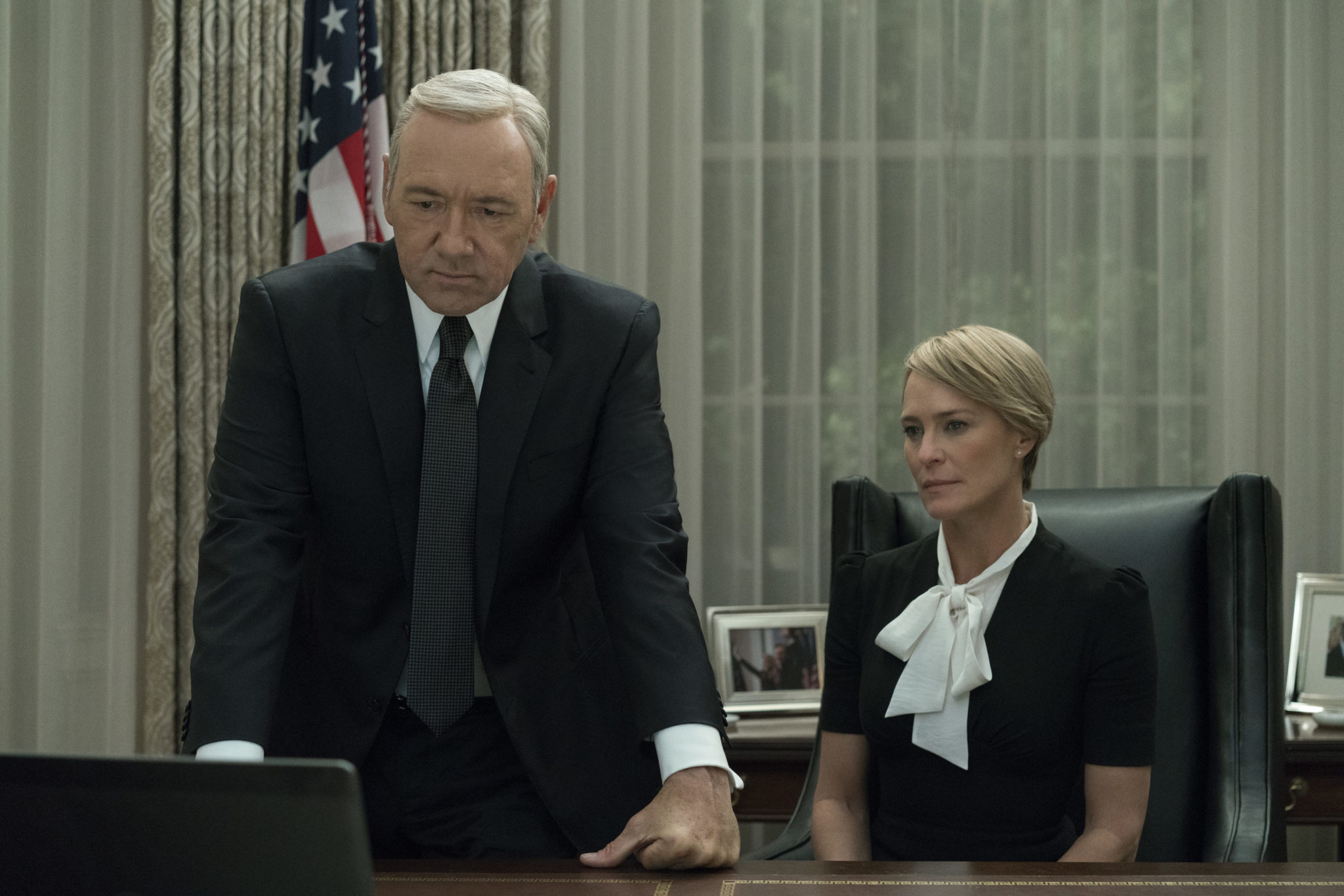A president who views everything as a transaction. A White House seemingly run by a very small clutch of accomplices. Back-stabbings and scandals always ready to boil over. An administration that talks a big game but can’t claim very many actual accomplishments.
The above could be said for Donald Trump‘s young presidency. It could also describe the new season of House of Cards, which premiered Tuesday on Netflix. Now five years in, the show exists very much within its own ecosystem and bears very little resemblance to how real-world political intrigue plays out. But when the actual White House is its own self-generating soap opera, can the sleazy exploits of President Frank Underwood (Kevin Spacey) and his wife-cum-running-mate Claire (Robin Wright) still entertain?
That’s the challenge that Frank Pugliese and Melissa James Gibson, who took over as showrunners after series creator Beau Willimon‘s departure last year, ran into last November, when they were nearly finished shooting the new batch of 13 episodes. Now, instead of House of Cards being reviewed primarily as just another television show, every twist will inevitably be compared to the Trump Administration’s latest incident.
“One of the things we really talked about prior to the season happening, which is being played out live right now, is the degree to which the lines between entertainment, politics, and journalism have been blurring ever more,” Gibson says. “And it feels this presidency, in real-life, has become a 24-hour news show.”
Walk around Washington these days—or just read Twitter—and the consensus is still that real-life DC is less like House of Cards and more like Veep. But just as it did to HBO’s satire about a former president and her bumbling staff, the election of Donald Trump has forced, however unwarranted, a bit of an identity crisis on House of Cards. And any Netflix subscribers who are still trying to reconcile themselves with the events of 2016 will find plenty in the new season that’s eerily familiar. By the season’s final frame, the Underwoods have put their America through so much fake news, voter suppression, intelligence leaks, fear-mongering, isolationism, and electoral tampering, Trump’s outfit is tame by comparison.
The way Pugliese and Gibson see it, they’re just paying off narrative seeds planted several years back. The season’s scripts were written while last year’s Democratic and Republican primaries were still playing out—House of Cards‘ fourth season ended a few weeks shy of the general election between Frank and his Republican opponent (Joel Kinnaman)—and the crew was shooting the 11th episode by the time Election Day rolled around, Gibson says.
House of Cards and Veep debuted within a year of each other, at a time when the real-world White House seemed to float above increasingly sour political dynamics. And while it’s hard to name a pair of shows more dissimilar in tone, they’ve always shared the common thread of playing off our worst assumptions about public service. In the world of Veep, the United States is run by a confederacy of nincompoops. House of Cards‘ baroque take on Washington is a far darker place, teeming with ladder-climbers who will do anything—up to and including murder—to harden their grips on power. The key difference is that Veep always had the stronger claim on proximity to reality.
To be sure, many more of Trump’s antics would be more at home on Veep than on House of Cards—reviewing intelligence documents in full view of a dinner crowd, forcing lackeys to lie about crowd sizes, and gripping a glowing orb with a group of Middle Eastern monarchs are all more Meyeresque than Underwoodian. But when the President and his advisers are revealed as transactional, mirthless, and vindictive with every afternoon news dump, it’s hard not to see Trump and Frank Underwood as fellow travelers. White House staffers like longtime Underwood henchman Doug Stamper (Michael Kelly) repeatedly see their roles elevated and diminished; there’s a river of embarrassing news reports; in a nod to the “deep state,” Patricia Clarkson appears as, Pugliese says, “lifelong bureaucrat that might actually run everything.”
“If there are any similarities that are happening, it’s because our characters are a product of the moment in the way Trump is a product of the moment,” he says. “Different products, but both are cynical, both are corrupting. If there is any comparison, it happens in the same moment.”
But the moment does raise questions about where House of Cards can proceed in ways that still manage to surprise the audience. Robin Wright recently told Variety that “Trump has stolen all of our ideas for season 6.”
Considering where Claire Underwood ends this new season, at least one more batch of episodes seems likely. Netflix hasn’t made the call formally, but it seems inevitable the show’s future will give off Trumpian vibes. The question for House of Cards, though, is how it can stay fresh when so many of its viewers see the real-life president as the bad guy.
“Something else this season’s exploring that seems relevant to real-life and has resonance is the whole notion of complicity, Gibson says. “Francis is saying come along for this ride, and being ever more implicated in the ride. As citizens, this election is asking us—on the show and in real life—how far are we willing to go as observers. We’re not competing with the real world, but we are in dialogue with it.”




















